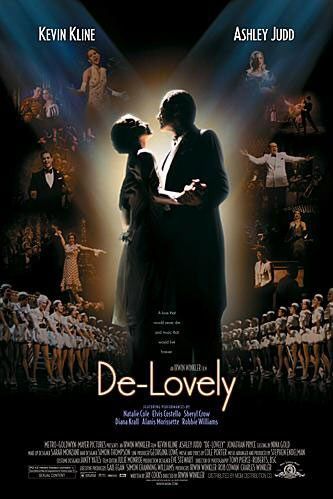“You Cannot Serve Two Masters”

| None | Light | Moderate | Heavy | |
|---|---|---|---|---|
| Language | ||||
| Violence | ||||
| Sex | ||||
| Nudity |
What You Need To Know:
Although this musical strongly but somewhat discreetly portrays Cole Porter’s perverse homosexual activities, the movie strongly suggests that Porter’s love for Linda eventually overcame his secret, perverse lifestyle and that, other than his best music, his love for her was the most pure thing in his life. Thus, the movie perhaps warrants an extreme caution rather than total rejection. Most of the music and musical performances are delightful, and are sometimes quite tender and poignant, especially when Cole honestly sings special love songs to his wife. Director Irwin Winkler, Kevin Kline, and Ashley Judd capture perfectly the emotional mood of Cole’s life, despite some melodramatic and superficial moments.
Content:
(Pa, B, HoHo, C, H, RH, LLL, V, SS, N, AA, D, M) Hedonistic pagan worldview with moral premise where true love between a married couple ultimately overcomes husband’s roving eye, with strong homosexual content and references, as well as redemptive premise and brief Christian references to eternal life, resurrection, prayer in a song, and the Angel Gabriel, and humanist atheist comment, some revisionist history; six light obscenities, five strong profanities, and 16 light profanities; a little violence such as man falls off horse which crushes his legs, a few comical pratfalls, and drop of blood on woman’s dress after miscarriage; brief homosexual kisses, hugs, and dancing, implied fornication between man and woman before they get married, man still in bed as his homosexual lover leaves, and some sexual innuendoes; upper male nudity; alcohol use and drunkenness; lots of smoking; and, miscellaneous immorality such as rebellion against social conventions, humanist sarcasm, and man’s friend surprises him with an all-night homosexual rendezvous.
GENRE: Musical/Biography
More Detail:
Starring Kevin Kline in a tour de force performance and Ashley Judd in an equally powerful one, DE-LOVELY opens with Cole Porter near death. Visited by an angel, perhaps Gabriel, played by Jonathan Pryce, Porter looks back over his life and his relationship with Linda. When they meet and eventually marry, Linda gives Porter permission to indulge his homosexual tastes, so long as he is discreet and doesn’t become infatuated with one man. Cole is not quite successful at either of those things, especially in Hollywood. Cole and Linda finally separate, but Linda returns to him when he suffers a horseback riding accident that leaves him crippled. The movie suggests that Cole finally realizes that Linda is his greatest love. Thus, heterosexual marriage is ultimately victorious over promiscuity and perversion.
Although there are a few homosexual kisses and dancing, the depiction of the lascivious part of Cole’s lifestyle is delicately implied, and the pain that his perversion causes Linda is clearly delineated. Thus, an extreme caution rather than an abhorrent label seems justified here.
Furthermore, most of the music and musical performances are absolutely delightful, and are sometimes quite tender and poignant, especially when Cole honestly sings special love songs to his wife, Linda. When he wasn’t making allusions to his immoral lifestyle, Cole Porter wrote some of the best songs and romantic ballads in the history of popular American music. Director Irvin Winkler, actor Kevin Kline, and the supporting players perfectly capture the mood and witty fun in many of Porter’s best songs.
The movie’s content remains problematic, of course. Some shallow-thinking liberals and other people who are not media literate may think what a shame it is that Mrs. Porter couldn’t let Mr. Porter indulge himself. If so, however, they would miss the moral conclusion this piece seems to make. For, DE-LOVELY clearly shows the perversity and emptiness of Cole Porter’s promiscuous homosexual activities.


 - Content:
- Content: 





